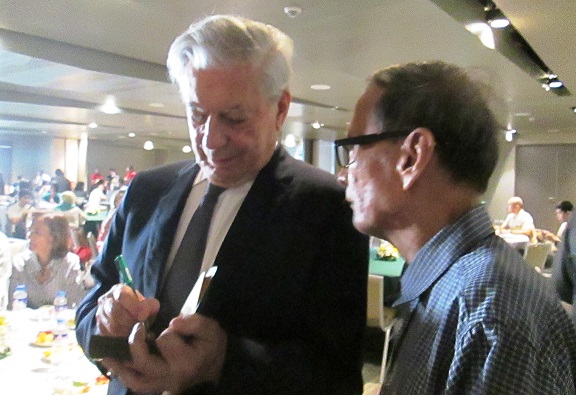By ELIZABETH LOLARGA
“And in keeping with his oft-repeated philosophical belief that novels should enhance and amplify life, not merely recount it, he has taken some liberties with history. But he quickly adds that ‘with essential facts, I have been loyal.’”–interview with Mario Vargas Llosa in January Magazine, 2002.
It is a fact of literary history that Mario Vargas Llosa, this year’s Nobel laureate for literature, visited the Philippines in the 1970s at the height of martial law and spoke before an audience of mainly Filipino writers at the annual Philippine Center of International P.E.N. conference at the Cultural Center’s main gallery.
I was sent by my managing editor Neal Cruz to cover the conference and the guest speaker’s talk, and it was one of the few times my account made the front page of the Philippines Daily Express. But the next day at the same venue, I received a gentle reproach from my former professor in stylistics, Nieves Epistola, who explained that I had wrongly referred to the Peruvian writer in subsequent paragraphs of my report as “Llosa.” His complete surname is “Vargas Llosa,” she said, the way Gabriel Garcia Marquez is “Garcia Marquez.” Mr. Cruz had missed that detail. Nevertheless, it was a clear scoop because I was the only reporter who covered the event of the few national dailies in circulation then.
I recall another delegate at that same conference, a black writer from apartheid-torn South Africa. Because the Philippines did not recognize his country due to its racist policy, he had to denounce openly that policy at the Bureau of Immigration in order to enter this country.
I also recall that these P.E.N. conferences would be conducted under an atmosphere of tension. Martial law had drawn a line dividing writers into those supportive of then President Marcos and those against him. When resolutions were being drawn up at the end of the conference, there would be acrimonious bickering on the wording of statements denouncing the imprisonment of writers and the suppression of press freedom.
I have no copy of my report ; I vaguely recall it had something to do with language, and the then dark-haired Vargas Llosa, garbed in a suit like the one in the picture, was, at some point, at a loss for words.
He struggled with his halting English. He paused at one point, gesticulated with his hands till he exasperatedly threw them and called English “this terrible language.”
Later, at lunch, performing arts Rosalinda L. Orosa went up to him and engaged him in conversation in his native Spanish, and he felt more at ease. If memory serves, National Artist Nick Joaquin, also conversant in Spanish, sat with Vargas Llosa and his wife.
I would read his books many years later when they became available.
Two stand out in memory: In Praise of the Stepmother and The Feast of the Goat. The first was, for me, an eye-opener on how a novelist can push the envelope in terms of choosing a permissible subject–here we have a madrasta engaging in torrid sex with a minor who is actually the seducer.
The second had me thinking in many parts while reading, “This is so much like what happened to our country.” The interlacing of sex and brutal power (South American dictators or many strongmen have a reputation of being ladies’ men or just run-of-the-mill rapists) has been noted in that novel, and I can’t help recalling the short story “When Dovie Moans” by R. Zamora Linmark from the recently published anthology Mondo Marcos as I write this.
I’ll have to visit the archives one day to look for a copy of that old news report on the dark-haired, pomaded man who came a-visiting and went on to win the Nobel.
Vargas Llosa is the first South American winner of the prestigious 10 million kronor ($1.5 million) Nobel literature prize since Colombian writer Gabriel Garcia Marquez won in 1982 and the first Spanish-language writer to win since Mexico’s Octavio Paz in 1990.The Nobel Prize is an international award administered by the Nobel Foundation in Stockholm, Sweden.
On Nov. 27, 1895, Alfred Nobel signed his last will and testament, giving the largest share of his fortune to a series of prizes, the Nobel Prizes. As described in Nobel’s will one part was dedicated to “the person who shall have produced in the field of literature the most outstanding work in an ideal direction”.
The Foundation said this year’s prize in literature was given to Vargas Llosa “for his cartography of structures of power and his trenchant images of the individual’s resistance, revolt, and defeat.”
